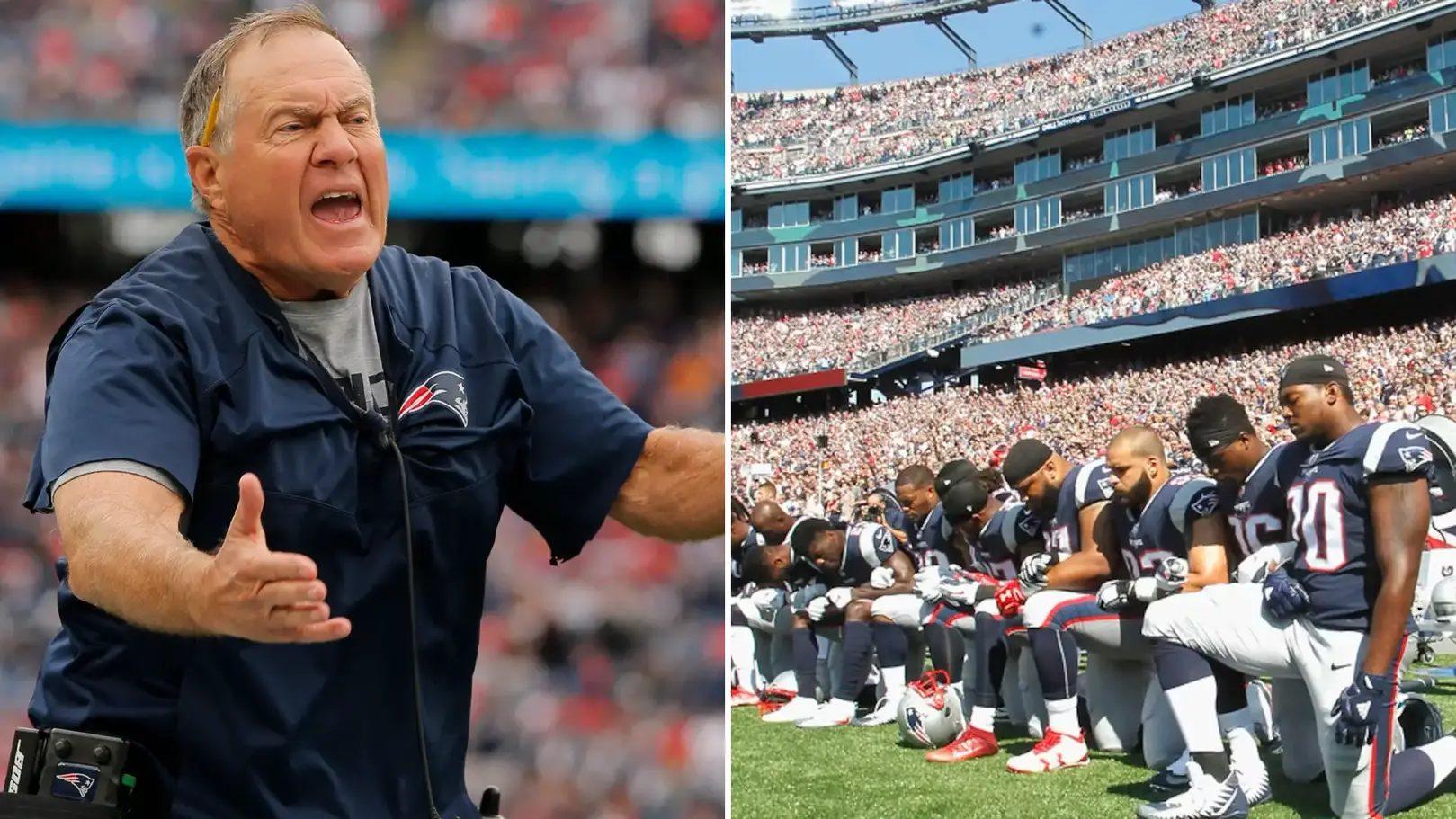“You’re Not an Activist”: Coach Belichick Benches Team Captain for Anthem Kneeling

In the robust and often politically charged arena of professional football, Coach Bill Belichick has long been regarded as a stalwart of tactical ingenuity and stringent leadership. His recent decision to suspend the New England Patriots’ team captain for kneeling during the national anthem, coupled with a stark message – “You’re not an activist” – has thrust him and the team into the epicenter of the enduring debate surrounding sports and social activism.
The act of kneeling during the national anthem as a silent protest against racial injustice has transcended its initial inception, now embedded as a potent symbol within the sports world and beyond. The gesture, first popularized by former NFL quarterback Colin Kaepernick, has since permeated various sports leagues, embodying an athlete’s commitment to leveraging their platform to spotlight societal issues.
Belichick’s move to suspend his team captain for engaging in this silent protest unveils a juxtaposition of ethics and team policy, heralding a maelstrom of public scrutiny, admiration from some quarters, and condemnation from others.
The suspension itself, a rare reprimand for an act typically enveloped in an athlete’s right to free expression, is punctuated by the explicit message delivered by the renowned coach. Belichick, often lauded for his football acumen, here confronts a dichotomy facing many in positions of leadership within the sports industry: to what extent should players’ political and social activism be allowed, or conversely, penalized, on the field?
The question is not merely of policy but extends into the philosophical realm, probing the role of athletes within societal discourses and how those in leadership positions, like coaches and managers, navigate the often tumultuous waters of political expression and team unity.
This suspension places an emphatic spotlight on locker room dynamics, potentially eliciting a spectrum of responses from other team members. For some, Belichick’s firm stance may be seen as a necessary assertion of discipline and focus within the team, steering clear of politically charged actions that may be viewed as distractions. For others, particularly those who view the act of kneeling as an essential and peaceful expression of personal beliefs and solidarity with a broader movement, the decision may sow seeds of dissent or disillusionment.
Similarly, fans and media outlets are bound to dissect this decision from multifaceted viewpoints. There will inevitably be those who perceive this move as a courageous stand against what they might view as the undue politicization of sports.
Contrarily, voices championing the rights of athletes to express their sociopolitical views, especially in an era of amplified calls for racial justice and social reform, are likely to scrutinize and challenge Belichick’s decision vehemently.
This particular incident with Coach Belichick and the team captain could serve as a flashpoint in the evolving narrative of sports and activism, potentially prompting other teams and leagues to reassess their stance on players expressing political sentiments on the field.
Is the primary role of the athlete to play the sport and entertain, devoid of political or social commentary? Or do athletes, particularly in prominent leagues like the NFL, bear a responsibility, or at least have a right, to utilize their platform to shine a light on issues that permeate society?
As this narrative unfolds, the intersection of sports, politics, and social justice will continue to stimulate robust debate and shape the ethos of the sporting world. Belichick’s decision to suspend his team captain for kneeling during the national anthem has amplified this conversation, propelling it into the broader public sphere with renewed vigor.
The ensuing dialogue, encompassing athletes, officials, fans, and pundits, will inexorably contribute to molding the future path of sports in a socio-political context, delineating the boundaries of expression within the arena of athletic competition.
News
HOT NEW : Ryan Reynolds reveals if his and Blake Lively’s fourth child’s name is on Taylor Swift’s new album
The IF actor welcomed his fourth child with the It Ends With Us actress in early 2023 While we may have gotten the names of Ryan Reynolds’ and Blake Lively’s second…
Hugh Jackman shares heartwarming family birth – after his children revealed they were ‘worried’ for their dad following split from Deborra-Lee Furness
Hugh Jackman announced some exciting news on Monday when he revealed a very anticipated birth finally happened in his home. The Hollywood star, 55, took to his Instagram…
Hugh Jackman shares heartwarming family birth – after his children revealed they were ‘worried’ for their dad following split from Deborra-Lee Furness
Hugh Jackman announced some exciting news on Monday when he revealed a very anticipated birth finally happened in his home. The Hollywood star, 55, took to his Instagram…
SEE : Sad detail in Hugh Jackman’s bachelor pad following his split from wife Deborra-Lee Furness
Fans have pointed out a sad detail in Hugh Jackman‘s latest selfie from inside his bachelor pad in New York City following his split from wife Deborra-Lee Furness. The 55-year-old actor…
HOT NEWS : Deborra-Lee Furness breaks silence on split from Hugh Jackman as she reflects on her life as a single woman
Deborra-Lee Furness has spent the months since her shock split from husband Hugh Jackman reflecting on her new single life. The pair split in September last year, and last…
The Worst Things Wolverine Has Ever Done: Killing X-Men, Creeping On Mary Jane & More
From all the X-Men movies, including the acclaimed “Logan,” to animated series like “X-Men ’97,” Wolverine is one of the biggest fan-favorite Marvel superheroes. With razor-sharp indestructible…
End of content
No more pages to load










